WHO Country Cooperation Strategy 2021–2025 for Somalia signs off. Partners hail it as a landmark event
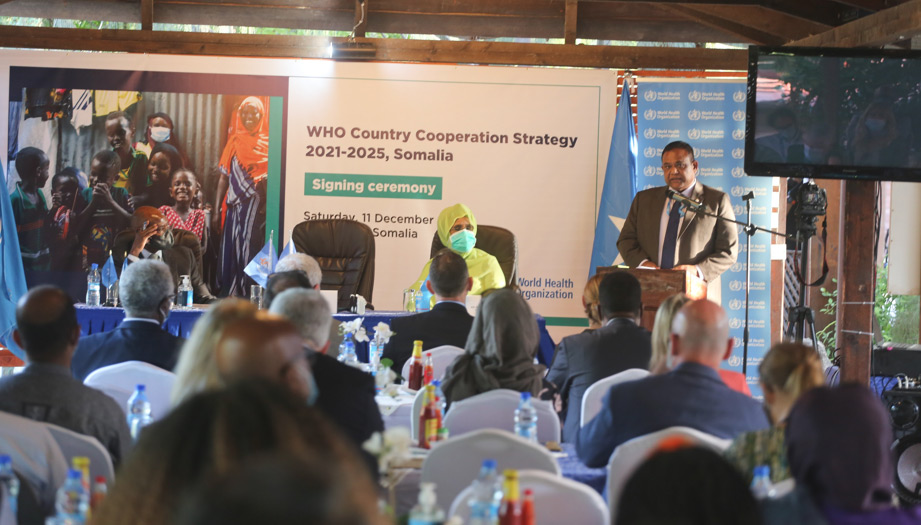
At a signing ceremony held in Mogadishu on 11 December 2021, on the eve of Universal Health Coverage Day, the World Health Organization (WHO) country office for Somalia launched its five-year Country Cooperation Strategy (CCS), 2021–2025, for Somalia, which will guide its health programme over the next five years in line with national development priorities. Dr Mamunur Rahman Malik, WHO Representative to Somalia and Head of Mission, presided over the event and signed the strategy which was co-signed by HE Dr Fawziya Abikar Nur, Minister of Health and Human Services of the Federal Government of Somalia, and Mr Adam Abdelmoula, Deputy Special Representative of the Secretary General (DSRSG) and United Nations Resident and Humanitarian Coordinator for Somalia.
The Ambassadors of Italy and the United Kingdom, and other Heads of Mission and senior officials from the European Union Delegation and United States of America and were amongst the dignitaries who attended this milestone event. Senior representatives and heads of United Nations agencies in Somalia, including the Food and Agricultural Organization (FAO), International Organization for Migration (IOM), United Nations Children’s Fund (UNICEF), United Nations Development Programme (UNDP), United Nations High Commissioner for Refugees (UNHCR), United Nations Office for the Coordination of Humanitarian Affairs (UNOCHA) and United Nations Office on Drugs and Crime (UNODC) also attended the ceremony.
While describing the mutual trust and spirit of collaboration that Somalia’s Federal Ministry of Health and WHO share, Dr Fawziya Abikar Nur said, “The Somali Federal Government has embarked on the implementation of a transformative agenda aimed at rebuilding its health system to achieve universal health coverage and improve health security. In line with their mandate, our trusted partner WHO is helping us strengthen our public health functions and our stewardship role to advance the health and well-being of the Somali people. The WHO’s Country Cooperation Strategy has been launched at the right time to help our country provide the right technical leadership and stewardship to achieve our vision of Health For All.
One of the first WHO country offices to launch its CCS since the onset of the COVID-19 pandemic
As one of the first few WHO country offices across the world to launch its CCS since the onset of the pandemic, WHO is demonstrating its commitment to supporting the health system of one of the most fragile and vulnerable countries in the world to recover from one of the worst national and global public health crises of our lifetimes. The CCS for 2021–2025 aims to support and rebuild the health system of Somalia to be more resilient, inclusive and responsive, so that everyone, everywhere, in the country can access quality health care services without any financial hardships. The timing of launch of the CCS, its strong focus on rebuilding the health system and the boldness shown by the country office in launching the strategy during the pandemic have been hailed by all partners and donors as a landmark achievement by WHO.
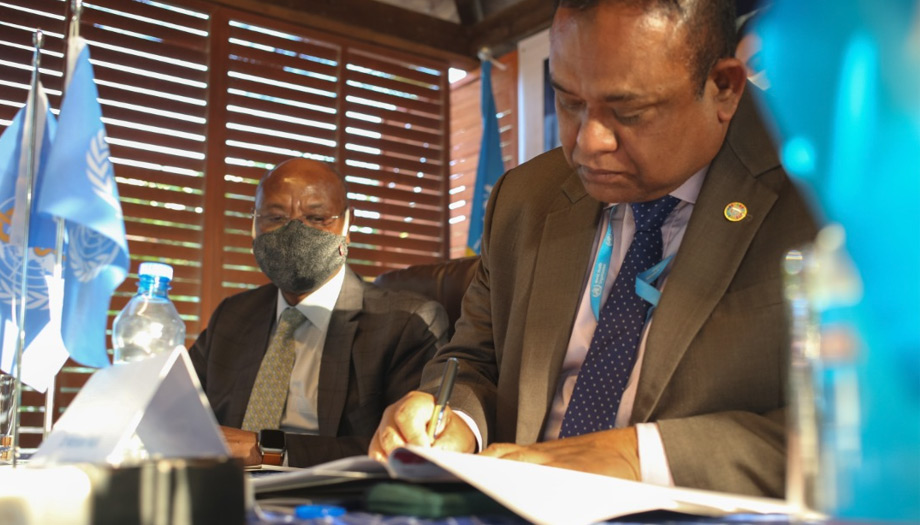
“We chose to launch this strategy and do other normative functions. Not because this has been easy, but because this was challenging, and because this will showcase our intent, our Organization’s vision and our goals when the country needs us the most. This strategy will test our energies and skills and measure the impact that we create,” Dr Mamunur Malik said at the CCS launch event.
Aligned with Somalia’s national health and development goals, the CCS is a tool to implement the WHO’s Thirteenth General Programme of Work 2019–2023 (GPW 13) that aims to drive progress in health at the country level, in unison with ministries of health.
Acknowledging that the CCS complements the United Nations Sustainable Development Cooperation Framework (UNSDCF), Mr Adam Abdelmoula, reiterated the support of United Nations agencies for both WHO and the Federal Ministry of Health to ensure that good-quality, accessible and equitable health services are available to improve the health of all Somalis.
Supporting Somalis towards a healthier, more productive future
WHO Somalia’s CCS, which algins with GPW 13, aims to “support Somalis to a healthier, productive future” and rests on four main strategic priorities: advancing universal health coverage (UHC) through primary health care to support the goals of integrated health services; enhancing health security by strengthening emergency preparedness, surveillance and response; promoting healthier populations and well-being by addressing the social determinants of health; and strengthening health governance using the Global Action Plan for Health and Well-being for All (GAP) to support joint and collective actions to achieve the health-related Sustainable Development Goals (SDGs).
The CCS will support the government to advance its agenda of attaining UHC, so that more people will have equitable access to essential health services without having to suffer financial hardship – Somalia’s UHC index is currently just 25 out of 100, as compared to the global average of 68 out of 100 in 2019.
The CCS will help to better ensure that initiatives undertaken will improve the lives of Somali populations of all ages and backgrounds, no matter where they live across the country. The overall improvements in access to health will have profound effects on economic growth and productivity, as well as on peace and development.
Serving Somalis of all ages no matter where they live
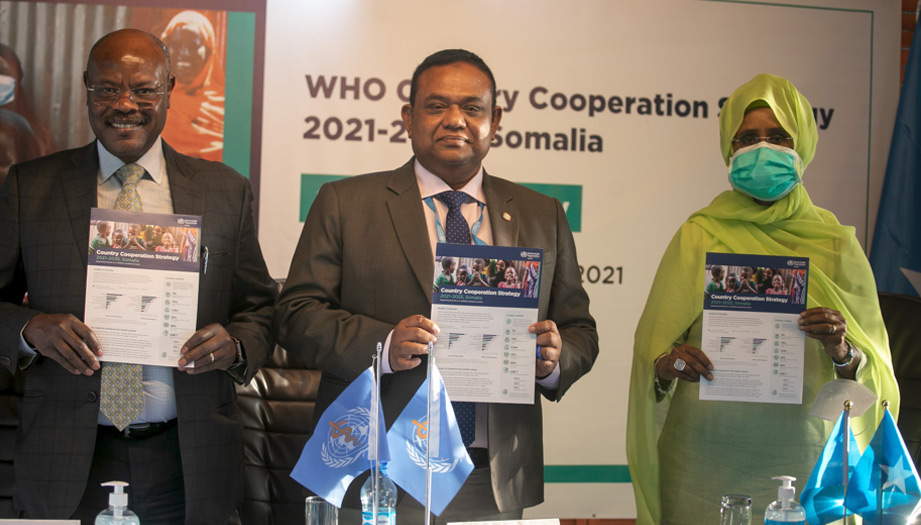
T
To serve children – Somalia future leaders – the CCS will scale up childhood immunization coverage in the country. By spending US$ 7 per child, the CCS will aim to fully vaccinate all vulnerable children against all routine diseases targeted as part of the expanded programme on immunization (EPI). By delivering vaccines at household level, Somalia will be able to forge a reliable contact point between families and essential and life-saving primary health care service providers.
For mothers, community midwives will provide simple, but effective, evidence-based means for reducing infant mortality, including breastfeeding and “kangaroo” mother care, as well as encouraging both antenatal and postnatal care.
Investment in community health workers, 80% of whom are women, will ensure that Somalia reaps the benefits in health, economic growth and gender equality. Meanwhile, investments in community health workers will help close the gap in access to health services between different subpopulations and boost economic returns due to the greater productivity of a healthier population.
While focusing on three of the top 10 causes of deaths and disabilities in Somalia – noncommunicable diseases, injuries and mental health – the CCS will also invest in health and nutrition, and combatting communicable diseases. In addition, the strategy aims to steer progress in reducing the current carbon footprint of the health sector and the negative health effects of fuels used in Somalia. Furthermore, the CCS will aim to deliver on its promise, in line with its global mandate, to use sustainable, cost-effective, high-impact innovations to save lives.
WHO will continue to strengthen its existing partnerships and forge new ones, to make the right and timely investments in institutions, systems and the health workforce to ensure that the health services offered respond to everyone’s needs, values and preferences.
WHO’s report on establishing emergency, critical and operative care services in a fragile setting while capitalizing on the COVID-19 response in Somalia officially launched
14 December 2021 – On 9 December 2021, the World Health Organization (WHO) country office for Somalia officially launched a report entitled ‘Capitalizing on the COVID-19 response: towards establishing emergency, critical and operative care services in a fragile setting.’ Led by the WHO Representative to Somalia, Dr Mamunur Malik, this official launch was attended by other dignitaries, including: the Federal Minister of Health and Human Services of Somalia HE Dr Fawziya Abikar Nur; the Deputy Special Representative of the Secretary-General and United Nations Resident and Humanitarian Coordinator for Somalia Mr Adam Abdelmoula; and the World Bank Country Manager for Somalia Ms Kristina Svensson. The launch was followed by a webinar to stimulate rich discussions around opportunities to build a stronger and resilient health system in Somalia, through the lens of emergency, critical and operative care services in a fragile setting.
High-level participants engage in stimulating discussions
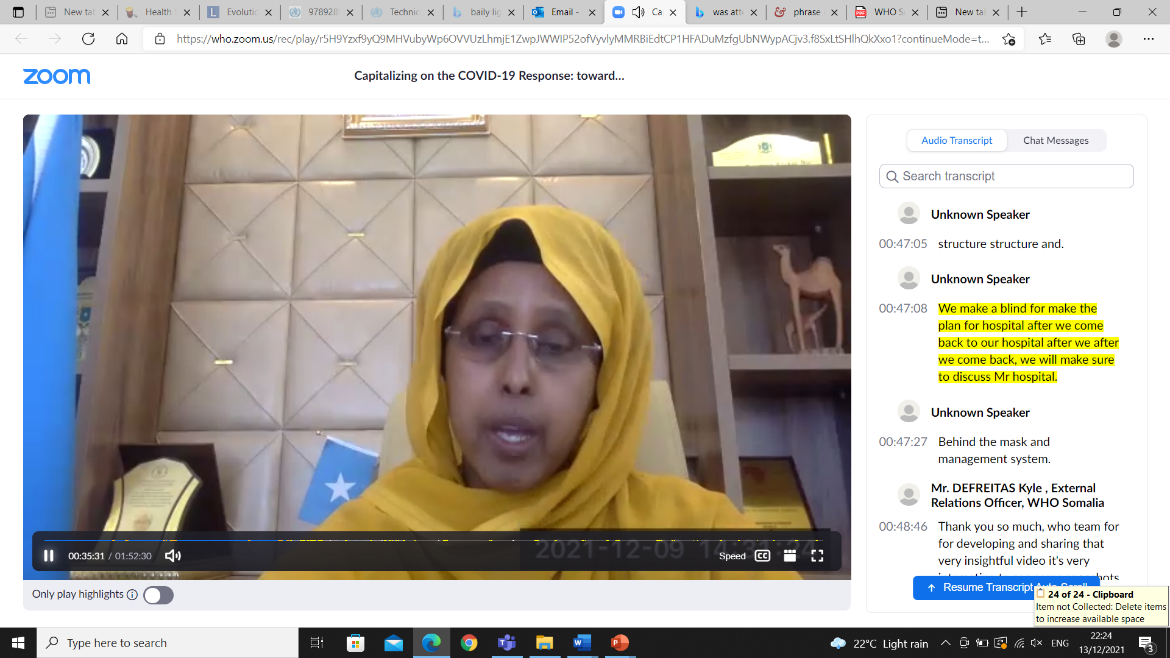 HE Dr Fawziya Abikar Nur, the Federal Health Minister explained how the activities conducted for COVID-19 would build and strengthen a resilient health system in the countryThe high-level participants delivered opening remarks to set the tone and stage for the webinar. During her opening remarks, HE Dr Fawziya Abikar Nur said, “One of the important lessons that we all learned during the COVID-19 pandemic is that it is imperative to invest in all components and levels of health system, not only on primary level care alone. Through the support received from the World Bank and WHO, a series of activities were implemented to improve access of Somalis to good quality emergency and critical care services. The outcomes of these activities will help build sustainable emergency care services for all medical and surgical conditions.”
HE Dr Fawziya Abikar Nur, the Federal Health Minister explained how the activities conducted for COVID-19 would build and strengthen a resilient health system in the countryThe high-level participants delivered opening remarks to set the tone and stage for the webinar. During her opening remarks, HE Dr Fawziya Abikar Nur said, “One of the important lessons that we all learned during the COVID-19 pandemic is that it is imperative to invest in all components and levels of health system, not only on primary level care alone. Through the support received from the World Bank and WHO, a series of activities were implemented to improve access of Somalis to good quality emergency and critical care services. The outcomes of these activities will help build sustainable emergency care services for all medical and surgical conditions.”
She added that a hospital assessment conducted as part of these activities will offer evidence for informed decision-making, as stakeholders will better understand the emergency, critical and operative care services situation in the country, in efforts to build a long-term strategy to strengthen emergency care services and integrate them into primary and secondary levels of care, while advancing towards universal health coverage (UHC).
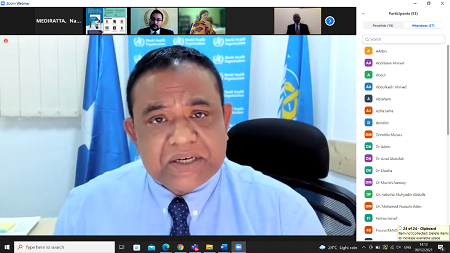 Dr Mamunur Rahman Malik, WHO Representative and Head of Mission to Somalia, explained the need for critical care in Somalia drawing evidence from recent studies The WHO Representative and Head of Mission to Somalia, Dr Mamunur Malik, reiterated a key lesson learnt from the COVID-19 response in Somalia, saying, “Patients receiving simple medical oxygen were up to 5 times more likely to survive than those who were on a ventilator. This shows the dire need for critical care support and services in all settings, including fragile ones. These services need to be affordable, sustainable, delivered within the ‘golden hour’, aligned with national health priorities, and rapidly implementable to a large scale to reduce preventable deaths and suffering.”
Dr Mamunur Rahman Malik, WHO Representative and Head of Mission to Somalia, explained the need for critical care in Somalia drawing evidence from recent studies The WHO Representative and Head of Mission to Somalia, Dr Mamunur Malik, reiterated a key lesson learnt from the COVID-19 response in Somalia, saying, “Patients receiving simple medical oxygen were up to 5 times more likely to survive than those who were on a ventilator. This shows the dire need for critical care support and services in all settings, including fragile ones. These services need to be affordable, sustainable, delivered within the ‘golden hour’, aligned with national health priorities, and rapidly implementable to a large scale to reduce preventable deaths and suffering.”
While reaffirming the United Nations’ support to the Somali health system and WHO in their endeavours, Mr Abdelmoula, Deputy Special Representative of the Secretary-General and United Nations Resident and Humanitarian Coordinator for Somalia, emphasized the importance of emergency care in Somalia.
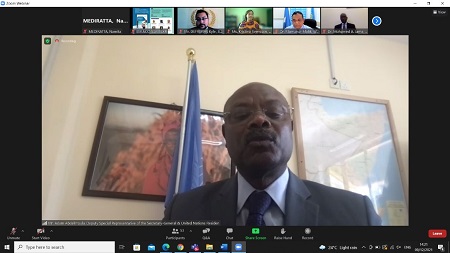 Mr Adam Abdelmoula, Deputy Special Representative of the Secretary-General and United Nations Resident and Humanitarian Coordinator stressed how the COVID-19 pandemic has shown the importance of critical care services He said that, “The COVID-19 pandemic has revealed that emergency care is critical to the achievement of UHC. Emergency care serves as a safety net and last resort for people with life-threatening health conditions who cannot be treated at the primary care level.”
Mr Adam Abdelmoula, Deputy Special Representative of the Secretary-General and United Nations Resident and Humanitarian Coordinator stressed how the COVID-19 pandemic has shown the importance of critical care services He said that, “The COVID-19 pandemic has revealed that emergency care is critical to the achievement of UHC. Emergency care serves as a safety net and last resort for people with life-threatening health conditions who cannot be treated at the primary care level.”
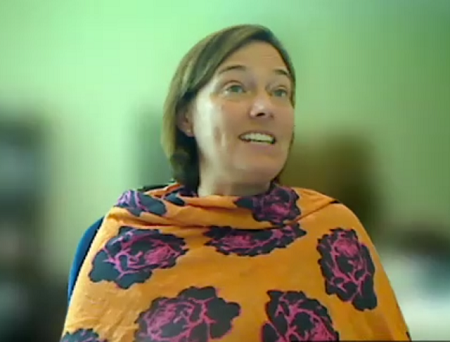 Ms. Kristina Svensson, the World Bank Country Manager for Somalia reiterated the World Bank’s support to Somalia“We are happy to see that the support from the World Bank’s Pandemic Emergency Financing Facility went towards the capacity-building of frontline workers, which we all have learnt in hindsight is one of the best tools to fight the pandemic. This is only the start of our support to Somalia,” said Ms Svensson, the World Bank’s Country Manager for Somalia. While describing the World Bank’s crisis recovery efforts, Ms Svensson also called on donors and agencies active in the health care sector to work on improved coordination under the leadership of the Government.
Ms. Kristina Svensson, the World Bank Country Manager for Somalia reiterated the World Bank’s support to Somalia“We are happy to see that the support from the World Bank’s Pandemic Emergency Financing Facility went towards the capacity-building of frontline workers, which we all have learnt in hindsight is one of the best tools to fight the pandemic. This is only the start of our support to Somalia,” said Ms Svensson, the World Bank’s Country Manager for Somalia. While describing the World Bank’s crisis recovery efforts, Ms Svensson also called on donors and agencies active in the health care sector to work on improved coordination under the leadership of the Government.
Panel session on developing and sustaining emergency, critical and operative care services in Somalia
Following the official launch of the report by Dr Mamunur Malik and handing over the report to HE Dr Fawziya Nur and Ms Svensson, the WHO’s Head of Unit for Clinical Services and Systems, Dr Teri Reynolds, explained to the audience how emergency, critical and operative care links with a health system’s goals, UHC, and the essential packages of health services, which countries such as Somalia will be rolling out soon to better ensure health for all.
Dr Mohamed Abdi Jama, Senior Policy Advisor to the Ministry of Health, Federal Government of Somalia, then led a panel discussion on developing and sustaining emergency, critical and operative care services in Somalia, with a view to achieving UHC. He engaged the panelists to hear more about their experiences and lessons learned, discussing future opportunities with regard to sustainable capacity- and institution-building in emergency, critical and operative care services.
Experts on the panel included: Mr Ibrahim Mohamed Nur, Senior Health Management Information Systems and Health System Specialist, Federal Ministry of Health of Somalia; Dr Ibrahim Hussein Ali, Emergency Medical Coordinator, Federal Ministry of Health of Somalia; Dr Bernard Olayo, Senior Health Specialist, World Bank; Dr Sara Halimah, Regional Trauma Specialist, WHO Regional Office for the Eastern Mediterranean; Dr Pryanka Relan, Technical Officer, WHO; and Dr Zainab Abdirahman Ali, a trainee and medical doctor at the Galkayo Hospital. Each shared invaluable experiences and insights with respect to their engagement and support under this project, as well as what the project has meant for improved health services across the country.
Paving the way to offer robust emergency, critical and operative care
Through these institution- and capacity-building interventions, and inclusive discussions, assessments and analysis, Somalia’s Federal Government, WHO, the World Bank and other key partners have already started to lay the foundation for robust, good quality and affordable emergency, critical and operative care that all Somalis will be able to access, both now and in the near future.
Universal Health Coverage Day: translating the dream of ‘health for all’ into a reality
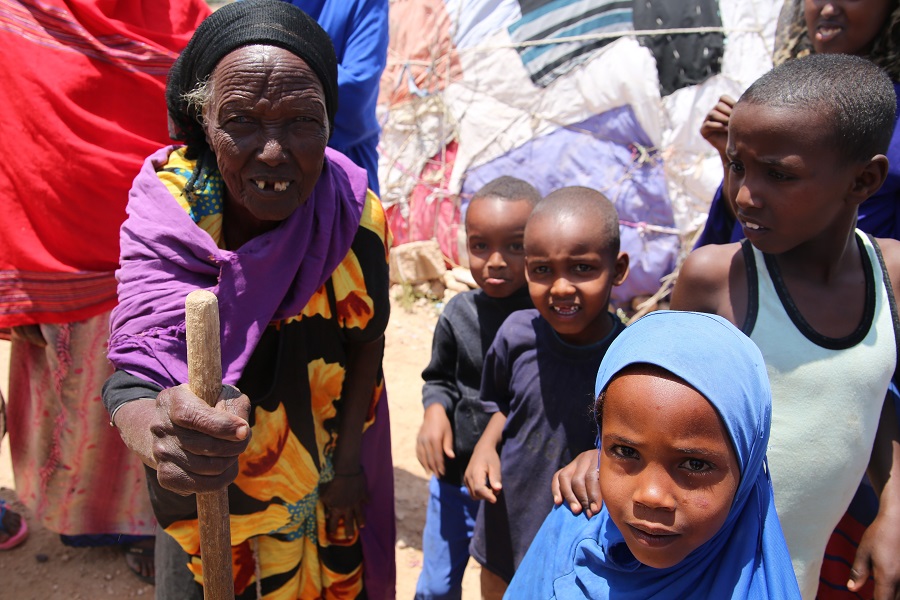 The concept of UHC addresses people of all backgrounds and ages. Credit: Fouzia Bano
The concept of UHC addresses people of all backgrounds and ages. Credit: Fouzia Bano
12 December 2021 – In 2012, in acknowledgement of the role health plays in social, economic and political aspects of life, the United Nations General Assembly passed a resolution urging countries to progress towards the concept of universal health coverage (UHC). UHC means that all individuals and communities receive the health services they need without suffering financial hardship.
To raise awareness about this concept, every year since 2012, UHC Day has been commemorated on 12 December. This year, the theme for the day is ‘Leaving no one’s health behind: Investing in health systems for all.’ This theme is relevant for countries worldwide, including Somalia, particularly after the secondary impacts of COVID-19 pandemic on a fragile health system in the country.
Struggle to pay for health services
In Dusamareb, Galmudug State, as a single mother, Amina Abdulle Mohamud is worried about her 6 children’s future. Her work allows them to cover the daily needs, with limited savings for the future. Her former husband, who is jobless, cannot contribute to the children’s living expenses and the Government cannot offer much support with health and education either.
Recently, Amina’s eldest daughter, Siham, suddenly collapsed. Amina rushed her daughter to the city hospital, where they were referred to a hospital in Mogadishu. While reaching the Digfer Hospital, Amina had already spent US$ 400. After a week of being admitted at the facility, Siham was diagnosed with epilepsy. By the time they returned home, Amina had spent US$ 1200 for treatment of her eldest daughter.
“I come from a middle-class family and I am still really struggling to pay bills and look after the health of my children,” said Amina pensively. “I don’t know how people with less money are coping.”
The Mohamud family is not the only one finding it hard to pay for health services out of their own pockets, with so many other priorities to pay for.
With one of the most tenuous health systems in the world and decades of instability and recurring health emergencies putting communities to test, Somalia has a universal health coverage index of
25 out of 100, which shows how difficult it is to access health services needed.
Plans under way to offer essential package of health services
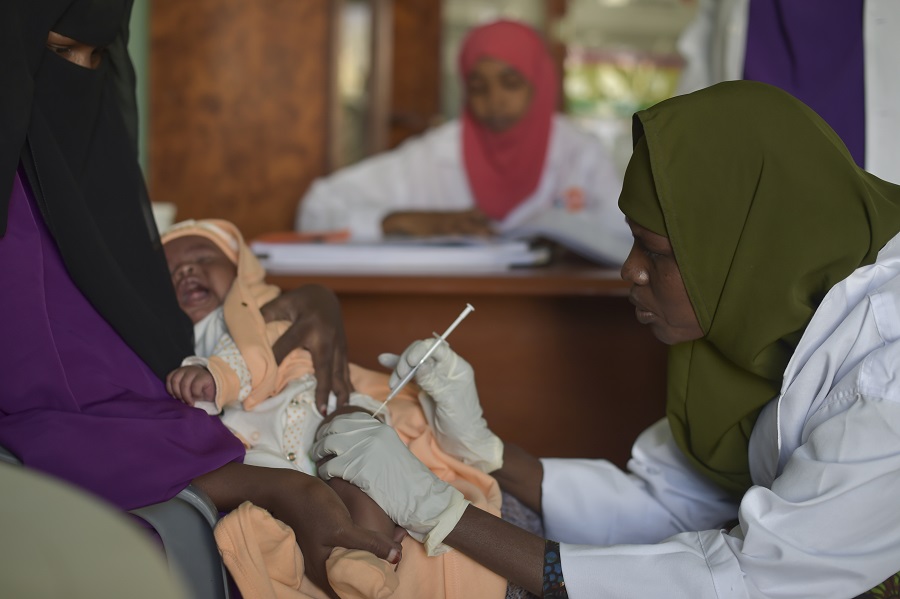 Plans are underway to implement the essential package of health services to reach more families. Credit: Tobin Jones
Plans are underway to implement the essential package of health services to reach more families. Credit: Tobin Jones
In 2018, the Federal Government of Somalia collaborated with the World Health Organization (WHO) and other partners to start the journey of rolling out UHC across the country. UHC comprises the full range of essential, quality health services, from health promotion to prevention, treatment, rehabilitation, and palliative care, all offered to people when and where they need them, and without facing any financial hardship.
Currently, plans are under way to implement a set of prioritized essential package of health services across the country using domestic and external resources, through the primary health care (PHC) approach. This means offering comprehensive, integrated levels of care and services that respond to the health needs of all the people, with a functioning referral system across all levels of care, in order to ensure that families like Amina’s are not pushed into poverty because of out-of-pocket expenditure.
The dream of UHC is achievable
PHC also means taking care of public health goods and functions, with a multisectoral approach to address the wider determinants of health, and empowering people in the field of health. PHC provides the 'programmatic engine' for UHC, the health-related Sustainable Development Goals and health security.
With the steps that WHO is taking in collaboration with the Ministry of Health and partners, the vision in the country is to ensure families like Amina’s do not fall into poverty because of catastrophic health expenditure.
“The dream of UHC is achievable, even in fragile settings,” said Dr Mamunur Rahman Malik, WHO Representative to Somalia. ”The concept of universal health coverage provides a unifying language that brings together social justice, and health equity through basic service provision and can be an opportunity in fragile contexts as the country slowly and gradually recovers from the COVID-19 pandemic. If we are to prevent future pandemics and achieve health and well-being for all by 2030, we must prioritize equity – invest more in health and allocate resources efficiently and equitably according to need of everyone, everywhere."
Related link
Antigen-based rapid diagnostic tests: a game-changer for COVID-19 testing in Somalia
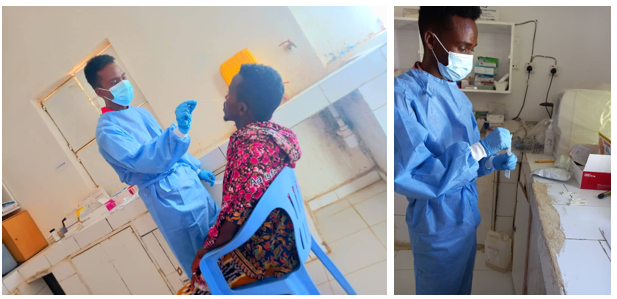 A laboratory technician collects a nasopharyngeal swab sample, then performs COVID-19 testing using Ag-RDT in rural health facility for Ag-RDT testing, Rako district, Karkaar region, referral health centre
A laboratory technician collects a nasopharyngeal swab sample, then performs COVID-19 testing using Ag-RDT in rural health facility for Ag-RDT testing, Rako district, Karkaar region, referral health centre
 Collection of nasopharyngeal swab sample, South West State, Somalia
Collection of nasopharyngeal swab sample, South West State, Somalia
7 December 2021 - As emphasized by the World Health Organization (WHO), testing is one of the key strategies to better understand and monitor the spread and trends of the transmission of SARS-COV-2 virus, which helps in timely detection of cases in order to mount an effective response. When the first case of COVID-19 was detected on 16 March 2020 in Somalia, the country had no testing capacities for SARS-COV-2. Instead, samples collected from suspected cases of COVID-19 in remote and hard-to-reach locations had to be shipped to the Kenya Medical Research Institute (KEMRI) in Nairobi, where 350 such samples were tested between March and April 2020.
To overcome this critical public health gap in the face of a global pandemic, Somalia was able to develop, equip and operationalize 3 molecular testing facilities – one each in Mogadishu, Garowe and Hargeisa – with support from WHO and other partners in record time. However, although this was a key step forward in building national testing capabilities, these laboratories were unable to meet the demand of the entire country for testing and samples collected from hard-to-reach areas still had to be shipped and transported to these 3 laboratories for testing – a process that would take on average 3 to 4 days. This is precisely why the introduction of antigen-based rapid diagnostic tests (Ag-RDT) across Somalia has been a game-changer for COVID-19 testing, detection and response in the country.
In Somalia, Ag-RDT has become key for point-of-care COVID-19 testing due to faster test results (i.e. 15-30 minutes), as well as there being no need for laboratory infrastructure or expensive equipment, which is beneficial in a country with limited resources. Moreover, the enhanced timeliness of diagnosis has enabled better decision-making for managing the spread COVID-19. It is in this regard that the WHO country office for Somalia joined hands with the Foundation for Innovative New Diagnostics (FIND) and the Federal Ministry of Health and Human Services to focus on the use and rapid rollout of the Ag-RDT in Somalia.
As part of this initiative, WHO, FIND and the Federal Ministry of Health and Human Services fixated on a number of important activities, including to: develop the testing protocol and training package for the use of Ag-RDT; develop a National Testing Strategy for COVID-19; and receive 41 250 Ag-RDT kits, donated by FIND to Somalia. With regard to the protocol and training package, both have been tailored to suit the country context and are geared towards training health workers, laboratory technicians and surveillance officers on: sample collection from suspected cases; testing; biosafety procedures during sample collection; disposal of hazardous materials; interpretation of the results and reporting; tools for collection; and criteria for eligibility of suspected cases for Ag-RDT testing. As of November 2021, a total of 133 (49 female, 84 male) health professionals from Somaliland, Puntland, Galmudug, Hirshabelle, South West, Banadir and Jubaland have been trained on how to use Ag-RDT.
Amal Hassan Mohamed, a laboratory specialist and microbiologist working at the National Public Health Laboratory based in Mogadishu, was one of the health professionals trained in the use of Ag-RDT under this project. Originally from Heliwaa, Amal said, “The training helped me to enrich my skills. On average, I run around 30–40 tests a day. Thanks to the training, I am more confident with using Ag-RDT tests and I know that many health professionals are also more confident now.”
To complement the above, a National Testing Strategy for COVID-19 is also being developed, which will define the priorities for establishing, expanding and ensuring high-quality laboratory testing for the diagnosis of COVID-19 across Somalia at national, state and regional levels.
In terms of the Ag-RDT kits that were donated by FIND, reports from the field already confirm considerable improvement in access to COVID-19 testing in remote areas and at points-of-care across Somalia, where access to PCR (polymerase chain reaction) testing is limited or non-existent. So far, 31 471 samples have been tested using Ag-RDT of which 3111 were confirmed positive (positivity rate of 10%), which means that Ag-RDT has already contributed to the detection of one fifth (i.e. 20%) of all confirmed COVID-19 cases across the country. It is clear from this initial data that the roll out and use of Ag-RDT across all health facilities and districts in Somalia could further improve access to testing, which would ultimately contribute to early detection of existing and new variants of COVID-19, as well as the need for isolating and following up on confirmed cases at the point-of-care. By reaching remote locations and populations, Somalia is also advancing towards one of its national goals to ensure no one is left behind in accessing health services.
The WHO country office for Somalia expresses its sincere appreciation to FIND for this important contribution, which has already shown positive results with respect to Somalia’s response to the COVID-19 pandemic.


